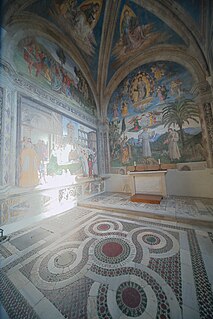 W
WThe Basso Della Rovere or Saint Augustine Chapel is located in the south aisle of the basilica of Santa Maria del Popolo in Rome. This is the third side chapel from the counterfaçade and was dedicated to St. Augustine. The cycle of beautiful quattrocento frescoes was executed by Pinturicchio and his workshop.
 W
WThe Bufalini Chapel is a side chapel of the church of Santa Maria in Aracoeli, Rome, Italy. The first chapel on the right after the entrance, it houses a cycle of frescoes executed c. 1484-1486 by Pinturicchio depicting the life of the Franciscan friar St. Bernardino of Siena, sainted in 1450.
 W
WThe Costa or St Catherine Chapel is located in the south aisle of the Basilica of Santa Maria del Popolo in Rome. This is the fourth side chapel from the counterfaçade and was dedicated to St Catherine of Alexandria. The lunettes were painted by the helpers of Pinturicchio and the marble altar-piece is attributed to Gian Cristoforo Romano.
 W
WThe Cybo or Saint Lawrence Chapel is the second side chapel in the right-hand aisle of the Basilica of Santa Maria del Popolo in Rome. For the beauty of its paintings, the preciousness of marble revetments covering its walls and the importance of the artists involved in its construction the chapel is regarded one of the most significant sacral monuments erected in Rome in the last quarter of the 17th century.
 W
WThe Della Rovere or Saint Jerome Chapel, otherwise the Chapel of the Nativity is the first side chapel in the south aisle of the Basilica of Santa Maria del Popolo in Rome. It was dedicated to the Virgin and Saint Jerome and decorated with the paintings of Pinturicchio and his pupils. It is one of the best preserved monuments of quattrocento art in Rome.
 W
WSanta Maria dei Monti is a cardinalatial titular church, located at 41 Via della Madonna dei Monti, at the intersection with Via dei Serpenti, in the rione Monti of Rome, Italy. The church is dedicated to the Blessed Virgin Mary.
 W
WTriumph of the Name of Jesus is a 17th-century fresco painting by Giovanni Battista Gaulli. The fresco occupies the nave of the Il Gesu, with both fresco painting and stucco molding.